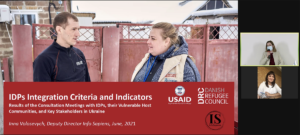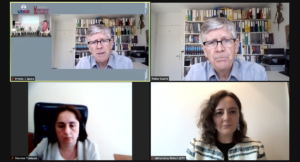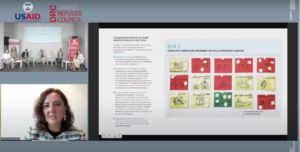The conflict in Ukraine has recently passed its 7th year mark and, as of October 2020, the country counts 1.5 million internally displaced persons (IDPs) from the regions of Donetsk, Luhansk and Crimea. While significant challenges persist, Ukraine has taken critical steps to address internal displacement and work towards longer-term solutions at the national and local levels, with support from national and international actors.
Ukraine is championing the implementation of the International Recommendations on IDP Statistics and efforts are underway to improve official statistics on IDPs, to inform a national monitoring system on local integration, as well as expand durable solutions analysis with local authorities at the Oblast level. In this article, we dive into how JIPS has been supporting these collaborative efforts at the global, national and provincial levels.


The recording of the national online conference “Looking Forward: Integration for IDPs in Ukraine – Challenges and Perspectives for the State Monitoring System of IDPs Integration” is available in English and Ukrainian.
While evidence on the needs and the integration level of IDPs is an essential prerequisite for formulating a comprehensive policy response towards durable solutions, official statistics and information on internally displaced communities remain scarce. Against this backdrop, Ukraine’s authorities have recognised the need for investing in approaches and tools to support IDPs’ (re-)integration efforts.
JIPS’ support in the country started off with a first exercise with UNHCR and the shelter cluster in 2016, two years after the beginning of the conflict. It was branched out in 2018–2020 with technical support for the implementation of a collaborative durable solutions profiling, led by the State Administration in Luhansk and the Norwegian Refugee Council (NRC), to analyse the displacement situation in the Luhansk Oblast (see the profiling report for more details).
This profiling exercise and the subsequent solutions workshop facilitated by JIPS, consolidated a way forward: the definition of an “internally displaced person” (de facto / de jure), the contextualisation of both solutions and action plan, the benchmarking of indicators, and ultimately an assessment of IDPs’ needs, vulnerabilities, coping strategies and future intentions – especially in comparison with the realities of non-displaced communities.
The exercise marked a considerable step forward as it fostered a better understanding of the displacement situation as a whole and provided key insights into IDPs’ main challenges to finding durable solutions, with poor access to adequate housing being one of the core barriers.
IDP integration is in the focus at the national level, under the government’s IDP strategy in Ukraine. Nevertheless, there is a lack of a deeper understanding of the complexities involved in supporting IDP integration, as well as a gap regarding tools to measure its progress. This has impeded the government’s ability to obtain the necessary data and thus develop effective policy reform options. The project “IDPs Integration Support Initiative in Ukraine”, led by the DRC with the financial support of the U.S. Agency for International Development (USAID), is part of an effort to bridge this gap and strengthen the capacity of the Ministry for Reintegration of Temporarily Occupied Territories of Ukraine (MRTOT) to lead the evidence-based policy planning towards the integration of IDPs.
As part of this project, a multi-stakeholder analysis was implemented to inform the national monitoring of integration of people displaced in Ukraine. The research project and outcomes were presented at a recent national online conference “Looking Forward: Integration for IDPs in Ukraine – Challenges and Perspectives for the State Monitoring System of IDPs Integration” (recording available in English and Ukrainian) in June 2021. Co-organised by the DRC and the MRTOT, and supported by USAID, JIPS’ Coordinator Wilhelmina Welsch contributed best practices to measuring local integration, drawing from JIPS’ lessons learnt in Ukraine as well as Kosovo and Greece and from the most recent technical discussions with partners as part of the Durable Solutions Analysis Learning Community.

JIPS’ Coordinator Wilhelmina Welsch presenting during the national conference on durable solutions for IDPs in Ukraine.
The research and findings presented at the conference are informed, on the one hand, by a desk review “Best International Practices on IDPs Integration Criteria and Indicators” (available in English and Ukrainian) on the best international practices of IDPs’ integration in data collection, processing and analysis. On the other hand, they build on the results of the thematic consultations with IDPs, host communities and key informants from state and non-state institutions (available in English and Ukrainian). The qualitative component sought to generate a common definition of ‘integration’ and to identify perceptions and expectations for integration initiatives. Currently, DRC and MRTOT with the support of international experts are developing the measurement framework for the state monitoring of IDPs integration, which would identify indicators and outline the implementation modalities for the state monitoring itself.
JIPS supported these efforts throughout by contributing technical expertise to a series of workshops and consultation meetings aimed at identifying pathways to the implementation of the related measure. The work, however, has only just begun: testing the local integration indicators and building relevant in-country capacity on data collection and analysis on durable solutions will be key to successful implementation.
Designing an integration measure and contextualising indicators for local integration very much rely on the availability of official statistics on Internally Displaced Persons.
JIPS and the SSSU (State Statistics Service of Ukraine) are also working together at the global level: both are long-standing members of the Expert Group on Refugee and IDP Statistics (EGRIS), and in 2020 the SSSU joined JIPS and others in the EGRIS Steering Committee. The SSSU also contributed alongside 14 other national statistical offices and experts from international organisations to the development of the International Recommendations on IDP Statistics (IRIS), an effort that was led by JIPS under the EGRIS umbrella.
The SSSU is currently working to roll out the IRIS in-country, with technical support from EGRIS members, including JIPS through the Group’s Subgroup 2 on Capacity Development. A webinar co-organised by the SSSU and IOM in December 2020, “International Recommendations and IDP Statistics in Ukraine”, set the stage and led to the creation of a working group involving state institutions, international organisations and civil society representatives, tasked with the elaboration of a roadmap for this purpose. As part of the peer-to-peer exchanges in Subgroup 2 – the SSSU shared valuable insights with partners engaged in IRIS implementation such as Somalia and Mexico.
The experiences and lessons learned so far in addressing internal displacement in Ukraine have also fed into the work of the UN Secretary-General’s High-Level Panel on Internal Displacement (High-Level Panel) on elaborating recommendations on the topic – in this context specifically linked to urban displacement. Through a series of consultations with city-level governmental and other actors as well as an expert roundtable, organised jointly with JIPS, UN-Habitat and the International Institute for Environment and Development (IIED) as technical partners, the High-Level Panel sought to better understand the unique challenges and opportunities presented by internal displacement in urban contexts.
Luhansk, Ukraine, featured among the six cities that were consulted, alongside Mosul, Iraq; Mogadishu, Somalia; Medellin, Colombia; and Kaya, Burkina Faso. The conversation focused on how the Luhansk Oblast Authorities’ response has adapted to IDPs in urban contexts, but also looked at the role of the IDP Council of Luhansk Oblast as a unique feature of the displacement response. In the synthesis report resulting from this process, the government representative emphasised, among others, the value of the evidence base that resulted from the 2019-2020 profiling exercise implemented in the region:
“[There was] high level of interest of the Department of Social Protection in the results of the IDP needs’ profiling. The exercise is important to increase the efficiency of support to IDP integration and develop effective and long-term solutions (particularly in housing and employment) in the framework of all projects and programmes active in the region, including the state and international ones. [We should also emphasise] the importance of the information about the actual numbers and needs of IDPs, and of a differentiated approach to the needs of IDPs living in the rural and urban communities.”
– Luhansk, Ukraine Oblast Authorities
The Regional IDP Council, under the authority of the Luhansk Regional State Administration, subsequently also submitted a set of recommendations to the High-Level Panel. The submission reinforces the call for support on efforts such as to develop their capacities to collect, analyse and use data on IDP situations; facilitate IDPs’ involvement in discussions and decision-making processes that relate to them; adopt a national strategy on IDP integration; and establish a monitoring mechanism.
In recent years and globally, we are witnessing an ever-growing political will to address internal displacement through policies that reflect an interpretation of the phenomenon as a protracted condition that requires long-term solutions, embracing transversally basic services all the way to urban planning. This is one of the cornerstone considerations at the heart of JIPS 2021-2023 Strategy, framing the challenges it aims to overcome through four key goals.
In Ukraine, although work is still in progress, the process towards a comprehensive and inclusive integration strategy and measurement is well underway. Both national and regional authorities are showing increased commitment to understanding and addressing the phenomenon – championing the implementation of global standards such as IRIS, as well as leading the way on IDP participation and ownership through the establishment of IDP Councils and the design of a contextualised IDP integration measure.
The profiling exercise implemented in the Luhansk Oblast has also generated interest in local authorities for a replication in the Donetsk Oblast, which is hosting the largest IDP population in the Government Controlled Area.
JIPS’ technical support in Ukraine has been made possible through the generous contribution from our donors, especially the United States Government through the State Department’s Bureau of Population, Refugees, and Migration (PRM).